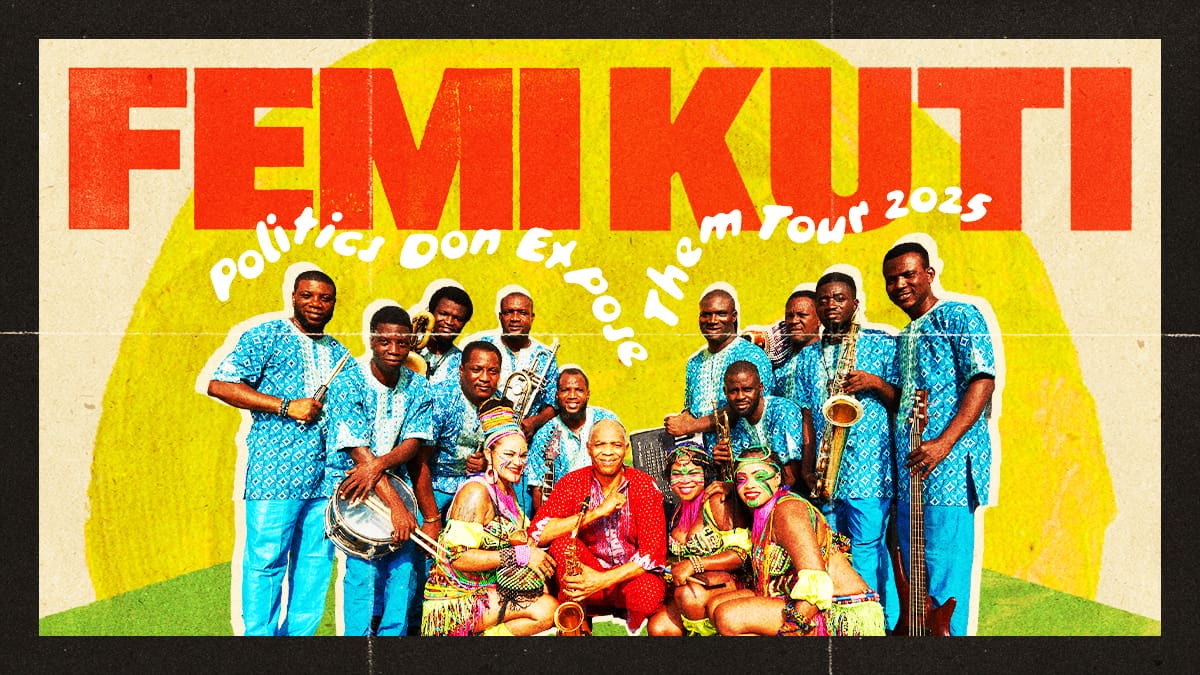
Femi Kuti & the Positive Force
Madame Gandhi
Add to Calendar
Tickets are non-transferable until 72 hours prior to the show time. Any tickets suspected of being purchased for the sole purpose of reselling can be cancelled at the discretion of 9:30 Club / Ticketmaster, and buyers may be denied future ticket purchases for I.M.P. shows. Opening acts, door times, and set times are always subject to change.
Femi Kuti

Throughout his prolific career, Femi Kuti has stood as a powerful voice for justice, carrying forward the revolutionary Afrobeat legacy pioneered by his father, Fela Kuti. Known for his unflinching critiques of political corruption and social inequality, Femi’s heady mix of funk, jazz and highlife has always been a tool for resistance and change.
But on Journey Through Life, his new album out in 2025 via Partisan Records, Femi turns inwards, balancing the political themes that have defined his career with deeply personal reflections on family, life, and inner growth: “I wanted to talk more about me, about my thoughts and the goals and values that have guided me all these years and led me to where I am now. I’ve never done that on an album before” says Femi.
Femi began his career as a member of Fela's legendary band, Egypt ’80, and briefly stepped into the role of frontman when his father was imprisoned on fabricated charges in 1984. In 1986 he left to create his own band Positive Force, and has been forging his own style of Afrobeat ever since, adding doses of R&B, rock, and hip hop to the traditional Yoruba rhythms and jazzy horns. Lyrically, however, his focus has remained firmly on issues of power, oppression, and social injustice, and his activism has extended beyond music through collaborations with organizations like Global Citizen and his role as a UNICEF goodwill ambassador.
“I’ve always been so political, and I will continue to be, but when I look back, my life has not only been about this. Yes, I get very depressed about my immediate environment and when I travel and I see sadness, but I also see how my music brings joy to people who come to my concert. I am a very homely person, I love my children very much, and I thought it was important for people to see that” says Femi.
The title track encapsulates Femi’s introspective journey, with his soaring sax solo mirroring the song's uplifting message. Against a backdrop of sturdy, syncopated rhythms, he encourages listeners to “enjoy and learn from experience/Make the best of your journey through life,” all while reflecting on its ephemeral nature.
Despite his more contemplative focus, Femi hasn’t turned his back to the wider world, and the politically charged energy that has long been a hallmark of his music is still strong across the album. On “Politics Don Expose Them” he refers back to one of his most famous tracks, 1998’s “Sorry Sorry”, which — in turn echoing the fierce message of Fela's “Zombie” — claimed there was no difference between the outgoing military regime and the politicians who were about to take power. “So this is just to say, I told you so. Politics has exposed the true character of our politicians, they are just as corrupt and have put us in a very bad predicament” says Femi. In true Kuti style, the biting lyrics are woven into melodious sax lines, impossibly catchy horn riffs, and squelchy synths — truly embodying the spirit of Femi’s signature “sweet music with a bitter message.”
“After 24 Years”, which has been recorded for the first time with new lyrics after decades of being a fan favorite in Lagos’ New Africa Shrine, echoes similar sentiments, with the chorus powerfully declaring: “after 24 years/with confidence we fit say/These politicians failed the nation” over triumphant horn riffs and a buoyant key motif.
The New African Shrine, which Femi runs with his sister Yeni, was established in 2000 to honor Fela’s legacy, and it continues to serve as a place of resistance and proud cultural expression. Femi’s Sunday night performances with his band The Positive Force have become iconic, and every year the Felabration festival celebrates Afrobeat’s impact on post-colonial Africa.
As Femi reflects on his journey so far, he revisits several other old tracks, including three — “Last Mugu,” “Oga Doctor,” and “Think My People Think” — dating back to the early '90s, not only in an effort to preserve his legacy but to reshape it in a way that mirrors the person he has become, both spiritually and musically. “Corruption Na Stealing” for example, initially recorded in 2018 for One People One World, re-emerges with a bolder, funkier sound that amplifies its message:“I never liked the mood really, I didn’t like the feeling it left me with. But when we played it live at The Shrine, it was one of the best, so I wanted to capture that feeling for this album” he explains. Similarly, “Shotan”, originally recorded live in 2004, takes on new life in this album with a fresh studio version infused with a raw, punk energy.
While he has always composed all of his own music, this marks the first time he has also been in charge of every aspect of production: “It was very important for me to do it this time, and probably for my future work. I am at a stage where I want to emphasize my creativity, expressing how I truly feel from deep within. I want to delve deeper—spiritually, socially, and politically as well.”
This is particularly clear on “Work on Myself”, where Femi candidly reflects on his feelings of helplessness in the face of global turmoil and his commitment to personal growth as a way to navigate it. “There is so much chaos around me, and sometimes I feel like I have no power to change anything. I feel so helpless, and I know a lot of people around the world feel the same. My way is to keep working on myself, to always become a better person and better musician” says Femi, adding that the moments of self reflection while working on this particular track have helped shape his “mind and soul”: “don’t forget, I am just a medium, I don’t know where the inspiration comes from, the more humble I am the more this ideas will come and and guide my life and prepare me for the future.”
This album is deeply personal for Femi in another way, as it was written while his daughter was going through some serious health issues: “It just made me reflect on a lot of things, and on my journey as a father.” It also follows Legacy+, the double album he worked on with his son Made: “Making music with my son reshaped the way I approach everything,” he says. “Each album feeds into the next, and without that experience, I wouldn’t be where I am today.”
Journey Through Life represents both a continuation and a departure for Femi Kuti. While he remains committed to using his music as a vehicle for political and social change, this album marks a new chapter, one where his inner reflections take center stage. “I think I will keep going in this direction,” he says of his future work. “This album has helped me learn more about myself, and I hope it can inspire others to do the same.”
At 62, Femi stands at a creative crossroads, poised to explore new depths while staying true to the roots that have shaped him. Journey Through Life offers a profound and personal reflection on the values, struggles, and triumphs that have defined Femi’s life, both on stage and off.
Madame Gandhi

The last time we heard from Madame Gandhi was via her effervescent, self-reflective album Vibrations
(Sony Masterworks, 2022). She had emerged from the pandemic, having spent time in homebound
introspection, even earning a master’s degree in Music, Science, and Technology from Stanford
University.
In contrast, for her follow-up, the rhythmic, eclectic, contact-high of Let Me Be Water (We Make Noise,
May 2025), she quite literally traveled to the ends of the world — the Arctic Circle and Antarctica. There,
she recorded the sounds of glaciers melting with hydrophones she had built at Stanford’s Center for
Computer Research in Music and Acoustics.
“I’ve drawn a lot of inspiration from nature,
” she explains.
“This is about realizing that we are nature.
”
Kiran “Madame” Gandhi — who began as a percussionist for M.I.A, before exploding into a genre-defying
musical artist — has navigated many paths to get to this place of peace. A decade ago, her free-bleeding
London Marathon run went viral, challenging stigmas around menstruation. Five years later, she delivered
a mainstage TED Talk (“Why We Must Stop Dancing to the Sound of Our Own Oppression”) which
elucidated her music-activism and gained millions of views online. Shortly after, the video for her song
“Waiting For Me” won a Jury Award at SXSW 2021. In between, she toured with Daybreaker opening
Oprah’s stadium tour, and her music was featured on Gutsy, Hillary Clinton’s AppleTV+ series, and
Netflix’s Never Have I Ever. Recently, she received the Songwriter’s Hall of Fame Abe Olman Prize and
was elected governor of her local Grammy chapter, championing unsung talent. Looking back, it’s clear
Kiran has incrementally lived up to her name, which means “ray of light” in Sanskrit.
Inspiration is a living, breathing, evolving entity for this cultural force who resides between Los Angeles
and London. Let Me Be Water, in kind, represents an artistic transformation for her: The album is an
appreciation of the grandeur of nature, but also our collective role in this greater force.
“It is about flow,
”
she says.
“It is about acceptance. It is about existing without pushback.
” And that is how Let Me Be Water
became the ultimate act of collaboration: Though co-produced and performed by Gandhi, it was actually
composed by 40 women and gender-expansive creatives.
Its opener, the percolating “Let Me Be Water,
” is a deceivingly effortless track that mingles spoken-word
samples and mantra-like house vocals with the aforementioned audio of melting glaciers. (Gandhi is no
stranger to this aesthetic, having recorded “In Purpose,
” a track composed of natural sounds, for
EarthPercent, a charity co-founded by Brian Eno to raise funds for environmental causes.) “The song is
absolutely a reference to climate, to protecting the planet,
” she explains.
“‘Let me be water’
— let’s
identify that we are all one with nature.
”
The idea of unifying several musical perspectives into one album came to her after leading a pair of
songwriting camps with We Make Noise, an organization and label founded by Erin Barra that’s devoted
to gender equity in music. Barra invited Gandhi to mentor the teams of artists first in 2023 at The Music
District in Colorado, then several months later at Arizona State University. (Alicia Key’s women-in-music
organization She Is the Music as well as the nonprofit Salt Lick Incubator helped fund the effort.) Gandhi
was asked to record only the winning song, she says,
“But after the vibe, camaraderie, and positive
energy of the experience, I decided to honor the efforts of all 10 teams and make it into a 10-song album.
”
She tapped Colby Lapolla from the camp to co-produce the album with her and further develop the songs.
Inclusiveness drove the We Make Noise sessions: Be electric and percussive, while being uplifting and
thoughtful, prioritizing lyrics with consciousness. The resulting music not only reflects these women
galvanizing, but also a desire to transmit that energy to whomever is listening. For instance, the winning
song, the worldly anthem “Rise!” is a self-affirmation that doubles as a call to action. Meanwhile, the pop
single “Take Your Time!” captures the ethos of introspection and manifestation that comes from taking
those bold steps. In 2018, a USC report found that only 2% of producers are women, which means it islikely that an even smaller percentage identify as trans or gender non-conforming. This album serves as a
direct response to combating this underwhelming statistic.
To set intentions each morning, Gandhi would lead the 40 songwriters in meditation, journaling, and
gentle yoga movement.
“It was experimental and cool,
” she says.
“We looked at themes around using
your purpose and passion to make a difference in the world. We looked at what it means to be aware of
others, and how does that play out?” Let Me Be Water clocks in at a little over 20 minutes, the same
amount of time she spends each morning meditating.
“You can dance, you can celebrate, you can work
out, you can get your day going,
” she says.
“It is made with the intention of making the audience feel
uplifted and empowered, and to celebrate the spirit of love.
”
A part of Let Me Be Water was inspired by Gandhi’s romantic partner, Team GB gold-medalist boxer
Lesley Sackey, whom she unofficially married at Burning Man in 2023. Sackey teaches boxing to
domestic violence survivors as a type of therapy and encouraged Gandhi to step into the ring for the first
time, too. For three months, Gandhi trained with a team of 10 women under Sackey’s coaching, and went
on to win a fight in London in 2024. The experience was so transformative that the album’s first single is
the paean to the sport: “Pisces Knockout” is an agile, auto-tuned track produced by Colby Lapolla paced
to a steady flow of power-hook shots and Indian Sarangi.
“The song is about unmasking, about fighting
the powers that keep us eating poorly and consuming harmful substances,
” says Gandhi, who also
became vegan and stopped drinking alcohol in recent years,
“advertising and marketing that keep us
addicted to many different things.
”
She found boxing to be an expression of “personal power and strength, stamina and commitment.
” To that
end, the set of photographs (shot by Lindsey Byrnes) for Let Me Be Water is inspired by the famous Life
magazine photos of Muhammad Ali training underwater. She hopes the steadied liberation woven
throughout Let Me Be Water will prove contagious.
“I do feel very much like a butterfly out of the cocoon
on the other side. I feel more in my power energy,
” she says.
“And when we show up for ourselves, it
ends up being medicine for others.
”
“The hyphen-rich vocalist-percussionist-speaker-producer-activist’s vibe isn’t so much “singer-songwriter”
as “icon of empowerment.
” Her frenetic odes to feminism, fluidity and freedom — carried off with the
assistance of an entirely female or nonbinary band — mash together fragments of electro-pop, trap,
Afrobeat and R&B, carried off with endless swagger.
”
– NPR
“A millennial with a voice that matters, Gandhi’s onstage persona thrives on bringing her art and activism
together. Young and defiant, sassy yet serious, she uses wordplay and wit to empower women.
“
– Vogue
“There’s more to Madame Gandhi’s music than foot-tapping beats and catchy rhythms– there’s purpose
to inspire change.
”
– ELLE India
9:30 Club
815 V St. NW
Washington, DC, 20001











